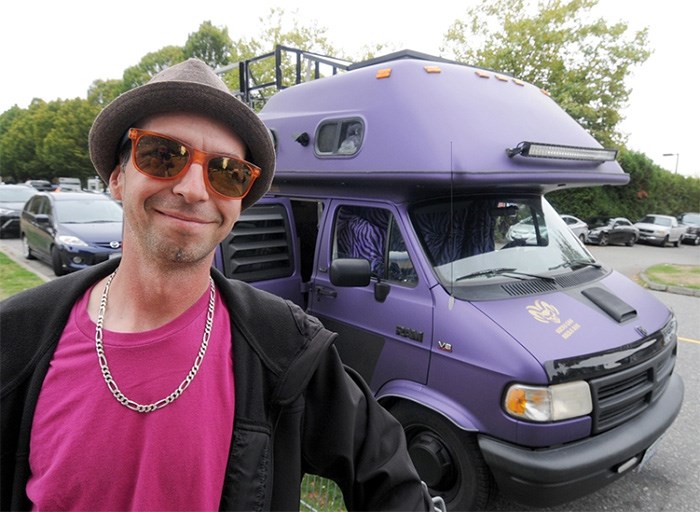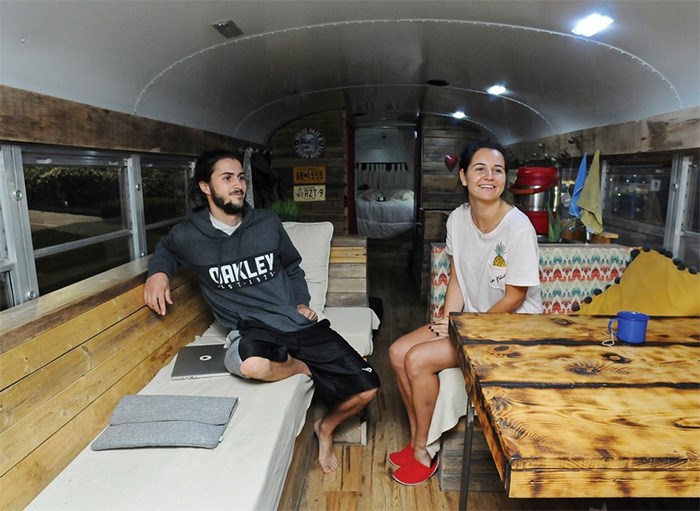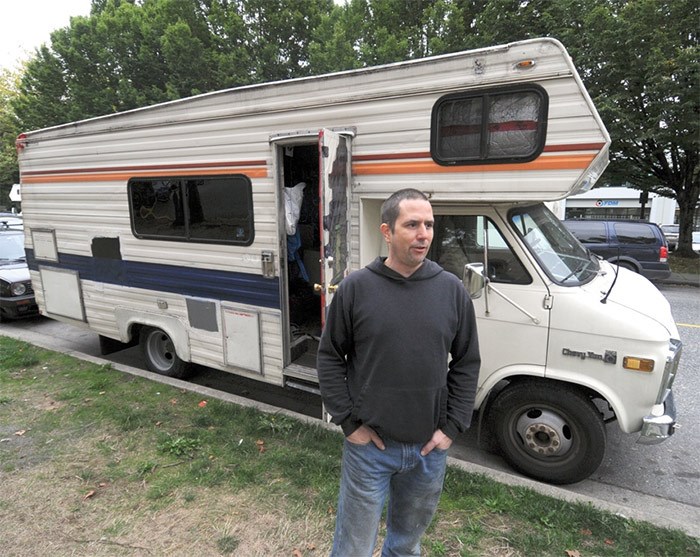 RV life ambassador Justin Credible poses with his purple ride and full-time home parked on a North Vancouver side street. photo Mike Wakefield, North Shore News
RV life ambassador Justin Credible poses with his purple ride and full-time home parked on a North Vancouver side street. photo Mike Wakefield, North Shore News
The housing crisis in the Lower Mainland has hit many people hard, but for some, life on the streets means freedom.
On any given night on the North Shore, there are people who comfortably live on the side of the road in an RV.
It’s a lifestyle choice for a handful of these so-called boondockers who have been at this for decades and say they plan to die in their RVs.
These are the stories of people on the North Shore who found themselves living on four wheels, and have no plans to stop rolling any time soon.
Carefree and comfy
A young woman wearing pyjamas watches the sun set over the mountains. She’s curled up by a window on a school bus that has been parked on this roadside for close to a month.
She’s clutching a tin camping mug and contemplating what adventure tomorrow will bring. Painted beneath the window on the outside of the bus is the word Ouest, which is French for “west.”
In June, Yanael Prat-Samuel and her boyfriend Laurence Ricard-Lacombe, 23 and 25 respectively, left their hometown of Shawinigan, Que., driving away in a rather unconventional vehicle for a road trip across the country.
The couple found a big yellow school bus for sale, forked over $4,000, gave it a major facelift and soon were on their way.
“We just want to travel,” says Prat-Samuel. “It was the perfect time in our lives before having a house, children and big responsibilities.”
The golden wheat fields of the Prairies morphed into the peaks of the Rocky Mountains as the bus rolled through the provinces.
Parking the school bus was never an issue in rural Canadian towns, but when the couple arrived in North Vancouver in August, it was a different story. There are few areas on the North Shore with relaxed parking regulations.
The couple found this place by chance. Walmart is their go-to store for stocking up, and that’s where they noticed a collection of RVs parked on the south side of Capilano Mall.
“We see a lot of RVs and we just say, ‘It’s OK to park,” says Ricard-Lacombe, with a charming French-Canadian accent.
This area is home base. In the morning the couple lounges around the bus eating breakfast, while nearby office workers hurriedly rush by below the window. Later on they will lock up the bus, hop in a Car2Go parked a couple steps away and head over the Lions Gate Bridge to explore the big city.
The News was invited on the bus to see how Prat-Samuel and Ricard-Lacombe live while on the road. The savvy duo stripped out endless rows of bench seats until they had a blank canvas to build their new home.
There’s a separated bedroom in the back with curtains on the windows and a chest of drawers at the foot of the bed. Midway up the aisle is the kitchen area with a sink and countertop, along with a stove and oven fuelled by propane. Some nights the couple will make pizza from scratch.
Up front, a pair of rainbow upholstered benches on either side of the aisle offer ample seating. All-in-all, the couple put $8,000 worth of upgrades into the bus, which they painted burgundy and white with black stripes.
And voila, a home on four wheels.
 Quebec natives Laurence Ricard-Lacombe and Yanael Prat-Samuel spent $8,000 converting a school bus into a home. – photo Cindy Goodman, North Shore News
Quebec natives Laurence Ricard-Lacombe and Yanael Prat-Samuel spent $8,000 converting a school bus into a home. – photo Cindy Goodman, North Shore News
There is one modern convenience the two are missing on the bus.
“A toilet,” says Prat-Samuel, without hesitation.
The outdoor enthusiasts don’t spend much time in the bus, just to eat and sleep. Saving up before they left, the couple’s monthly expenses on the road total $2,000 for gas, food, and other living costs.
The couple have followed the warm weather since June. But with October comes a chill in the air.
Soon the couple will pull out of North Van and head south in search of palm trees and blue skies in California.
Pinned on a board above the driver’s seat are overlapping pictures of family and friends back home.
Would they recommend this lifestyle to one of them?
“Oh yes, for sure,” says Prat-Samuel. “Because you are free.”
Boondockers for life
It’s nearing 6 p.m., shuffle time in this cobbled together RV community behind Capilano Mall.
“Round the mulberry bush.” That’s what Garnet Dean calls it.
The coveralls-clad octogenarian has been at this same routine since 2003, when he first parked his RV and full-time home in the area.
Around 6 p.m. is when most people working in the area leave and parking spots open up.
Dean employs the buddy system for snagging a spot. After he drives out, Dean’s friend John immediately pulls his motorhome forward into that spot. Dean then finishes the daily jigsaw game by parking behind his friend.
The boondockers, as they’re called, move one full vehicle length every day to stay in the bylaw officers’ good books. In a stroke of serendipity Dean met John, who arrived in the area with a 31-foot RV identical in size to his and with much more to offer.
Dean recently finished treatment for prostate and colon cancer – all while living in the RV by himself. The coveralls conceal his colostomy bag.
One day Dean was crouched down by his RV, struggling to fix the generator, which affords a comfortable life off the grid. Less than a day later the fridge broke and Dean had to throw all his food away.
“He was almost crying. He was so distraught,” says John of the day he first met Dean.
John (an alias to protect his identity) was himself in dire straits when he pulled into the neighbourhood. Marital woes forced him to move from the nearby family home and into a rundown RV, because that’s all he could afford.
“It was the coldest I’ve ever been,” says John. “I went and got a dog because I needed companionship and had no one to talk to.”
Fortunately, he found Dean and the two men look out for each other. While there is a generational gap – John is middle-aged – the friends bonded over their love of country music and their background in mechanics.
During the day, while John’s at work, Dean goes about his regular daily routine.
He heads to Lonsdale Quay, buys a paper and a cup of coffee and passes the time until noon. Once he’s had his fill of that, Dean hops on the SeaBus, then the Canada Line and rides the train until he reaches the airport.
“I used to fly when I was younger,” says the air force vet. “I’ll go out there (to YVR) and see all these birds coming and going. There’s always somebody to talk to.”
But Dean always keeps an eye on the clock, to make it home in time for motorhome musical chairs at 6 p.m. Later he will have dinner or dessert with John in one of the adjoining RVs.
It’s a couple days before Thanksgiving when the News meets John and Dean in the latter’s RV.
A can of pumpkin puree sits by the sink. The friends are getting all the fixings together for a Thanksgiving dinner, including turkey,and pumpkin pie à la mode.
Dean’s eyes light up when asked about an American flag and companion trucker cap adorned with a bald eagle, displayed prominently above the kitchen table, next to a large clock.
“Wait until (John) hears this one,” says Dean, his infectious laugh erupting.
One of the American souvenirs is a gift from a woman Dean met in the Mojave Desert. He tried to bring the woman back across the border, until he learned she had no passport and had never left California.
Dean has lived many lives, and John is more than happy to hear the stories.
“Every day is something new,” says John, smiling. “I guarantee you if you sit here for four or five hours, you don’t need a TV.”
Last Thanksgiving John had a house, something he thought he needed to survive.
His perspective has since shifted: You pare down your possessions to what you absolutely need and you learn to live with less and be happy.
“Well, you know, we’re not really homeless,” says John. “It’s just an alternative way of living.”
The area was packed bumper to bumper with RVs in the summer, those that remain are mostly locals. Eight of them, estimates Dean.
Both men say they expect to see more RVs showing up on this side street in the coming months, as Metro Vancouver’s affordable housing crisis shows no sign of slowing down.
They all come here with different stories. Dean talked to a young tradesman from Australia who was working at Seaspan and living in his vehicle.
Another tradesman used his skills to convert a U-Haul-type truck into a home. He carved out windows, built cabinets inside and put in a king-size bed.
Then there’s the older man living in a plumber’s van. Those in the Capilano Mall neighbourhood recognize him by his captain’s hat.
Dean will sit outside the RV in his rocking chair and make conversation with strangers.
A transistor radio stays on all night to keep Dean company in the RV. This is where he wants to live out the rest of his life.
“I probably will, because you know what: It’s no secret that I can’t afford $1,100 a month for a bachelor suite,” says Dean, adamantly. “Take this away from me and I’ll be sleeping under that bush.”
Maintenance and fuel costs this time of year are about $300 a month. Both John and Dean’s RVs are set up on solar power systems. There’s also a backup generator for the rainy days.
On this gloomy Friday morning, Dean has put on a fresh pot of coffee. A plate of cookies is already on the kitchen table. Dean is set to regale his friend with a tale from another life.
“I’m happy with this life,” says John. In a few short months, the two men have saved each other on this street. John introduced Dean to solar energy and in turn his friend taught him how to live a humble life.
Where the streets have no name
Justin Credible is a colourful ambassador for RV life.
An early off-the-grid adopter, Justin goes out of his way to get people’s attention and promote the lifestyle, using his penchant for purple.
Sporting sunglasses, a large chain and a fedora, Justin pokes his head out of his purple RV. A classic U2 song emanates from the surround sound system inside the cosy motorhome.
Hard to ignore are the purple zebra print accents, including sheets, curtains and seat covers, splashed throughout the RV. There’s even a purple air freshener. His purple game is on point.
“It was ugly off-white with horrible ugly RV stripes down the side,” says Justin, who has the voice of a radio announcer.
He just turned 37, but considers himself a pioneer for how to live happily on the cheap.
“It is kind of about the economics but I was doing this before the rental crisis. I’ve been doing this for 17 years,” says the seasoned vagabond.
Justin thrives on not having an address and being able to pick up at a moment’s notice and go.
He parks his purple home on wheels in North Vancouver, where he works full time as a delivery man.
But when the weekend hits, the outdoor enthusiast heads out of town. He feels satisfaction in taking off for Tofino or Whistler with some extra change in his pocket for gas, ferry tolls and recreational activities.
“That’s the beauty of this lifestyle is you don’t have a set cost,” says Justin. “You can live on a few hundred dollars a month or quite often I’ll spend more than the average Vancouverite does on rent, but that’s because I’m doing fun things.”
Justin hosts Camper-Cons and has a social media presence, answering questions on his website and offering resources for newbie RV dwellers.
“No mortgage, no yard work, no stress. Life on wheels is fantastic” reads Justin’s bio on his YouTube channel, JustinCredibleTV, which has amassed 30,161 subscribers and 6,027,529 views to date.
Justin’s audience is a mixed bag of people who are already RVing and those who want to. He’s heard from people who have sold their house or apartment, put stuff in storage and moved into a motorhome.
“And I’ve never had anyone tell me they regret it,” he says.
 William Price wasn’t a fan of apartment life, so now he lives in an RV on the street just down the block from his workplace. He says he has no interest in moving. – photo Mike Wakefield, North Shore News
William Price wasn’t a fan of apartment life, so now he lives in an RV on the street just down the block from his workplace. He says he has no interest in moving. – photo Mike Wakefield, North Shore News
William Price, a friend of Justin’s in the RV community, is someone who has no regrets. The 46-year-old has lived for six years in an RV parked a few steps from Walmart, where he works as a stockman.
Apartment life doesn’t suit Price. It’s unaffordable, he says, plus there are too many rules.
At the moment, he’s stringing up Halloween lights, bats and other spooky decorations around his RV, which he purchased for $700.
He picks up a free Wi-Fi signal from a nearby store and 13 TV channels from an antenna atop his roof.
Food is his big expense out here. Price spends about $300 every two weeks because he likes to eat. He’s about to put a “pound of bacon” on the mountain of tin-foiled potatoes sitting near his stove.
Pieces of an old Christmas train sit in stacked boxes, tied against the wall with yellow tape to prevent shifting.
“It was my dad’s,” explains Price. “I don’t really want to part with it but I don’t really need anything that’s 110 volts.”
How long does Price see himself living like this? “The rest of my life,” he says.
Justin was asked through his website if RV life cramps his style when it comes to dating.
His response: “I’ve never met a girl who didn’t immediately love it, and in fact have had many live-in relationships over the years, and even dated a girl who had her own camper van for quite a while. It’s been fantastic.”
When asked what he would do if someone handed him a house, the choice is clear for Justin.
“I’ll rent the damn thing out,” he says. “As long as there’s a parking spot in the driveway for my van, I’m happy.”


